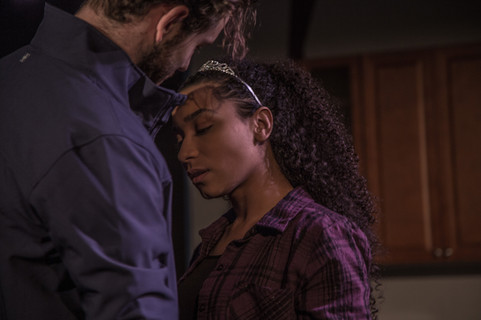Space Jams: 'Happy Birthday Mars Rover', 'Queen of Sock Pairing', & 'You Are Happy'
- chitheatretriathlon

- Dec 27, 2019
- 8 min read
Updated: Dec 27, 2019
These days it feels like most contemporary plays fall into two categories: post-apocalyptic and hyper-realism. This year alone, I could count on both my hands (maybe even more) how many I’ve seen that have identified as either or both. It’s completely understandable why the two genres feel resonant in the midst of political turbulence and with most of 2019 feeling like the end of days.
We close out this year with three picks that emulate these genres and go one step further in testing their limitations. Some feel limited by their choices while others feel liberated in how we can play with popular forms and topics within theatre and our culture. Prepare to board our last review roundup as we examine shows that integrate space, form, and timely stories in compelling ways.
Happy Birthday Mars Rover
Pictured above: The ensemble, Vic Kuligoski and Sarah Lo in The Passage Theatre's 'Happy Birthday Mars Rover'. Photos by Evelyn Landow.
If The Neo-Futurists and Mocrep had a baby, Happy Birthday Mars Rover would be their exuberant, animated offspring. In this world premiere by Preston Choi, The Passage Theatre demonstrates a commitment to uplifting voices of new, young, promising theatre makers. Choi takes on a lofty task of creating a play that identifies every issue that has led to our future's uncertainty through climate change. Understated prop design by Amelia Mroczkowski and space design by Maiya Corral prove to be great resources of resistance in this crumbling landscape. Seated in the round at Ravenswood Fellowship United Methodist Church, an hour and forty minutes zooms by, as quick and loving as its titular rover.
In line with Passage’s dedication to ensemble driven narratives, Happy Birthday Mars Rover weaves together many plots across time and space with forty-three scenes (!) in total. Scene titles are spoken aloud with each varying in setting, length, and tone. It would be interesting to imagine in a future production if the scenes were performed in a different order every evening, or in full Neo-Futurists fashion arranged by the audience. Ensemble members Liz Cloud, Cory Hardin, Em Haverty, Vic Kuligoski, Sarah Lo, and LaRose Washington juggle many roles and successfully bring an impressive individuality to each one they introduce, even if we only interact with them for a couple minutes or even seconds.
Director Alison Thvedt demonstrates an innate talent in making this multi-faceted play digestible and irrevocably memorable. Each scene is given merit as a standalone while still being tapped into the pulse of this work in how we can reconcile with the constant threat of death looming over us. What is the right way to ensure the future of humanity is promised? To procreate, pass down language and traditions to new generations, or live in blissful ignorance as an excuse for inaction? The answer as the play progresses seems to come in the form of another question: What if it's already too late?
Choi manages to pack in a lot of issues concerning our future through brilliantly comedic means. Housewives debate having children through one of their most masterful skills of passive aggression. While Dad jokes often hog the spotlight, Mom jokes get some much needed representation here. Two royals aim to make an heir on their wedding night with humorous intimacy choreography from Gaby Labotka. A pair of cows attempt to escape out of an electric fence that exemplifies the issues in the meat packing industry. In one scene titled "bubble: a life", Choi proves comedy is often best delivered in brevity.
Some of the production's best jokes come from references that are created within the play itself (like jars of hair). A recurring device comes from a series of extinction reports on species who have disappeared, delivered amusingly by an elementary school class. Each report is more hilarious than the next from the one who hates public speaking, another who goes off topic, and the student who instead of sticking to the assignment of choosing one animal covers many. One covers polar bears who aren't extinct----yet. Daniel Washelesky's dramaturgy feels especially noted, and welcomed here.
While comedy is cushioned as a vehicle to confront the uncomfortable truths about our existence, it makes the emotional beats of the piece land more heavy. There's a particularly touching scene that acknowledges the erasure of history with gentrification through a couple who struggled with HIV/AIDs in the 1980s'. A young woman is quarantined from her family with borders that are forbidden to cross. Toward the end, we nearly go full Handmaid's Tale with the introduction of Eves, the select women left on Earth who can bear children. From start to finish, Happy Birthday Mars Rovers presents a vibrant, twisted cat's cradle of who we are, what we make, and ultimately, what we leave behind.

Pictured above: LaRose Washington in The Passage Theatre's 'Happy Birthday Mars Rover'. Photo by Evelyn Landow.
Queen of Sock Pairing
Pictured above: (Left) Scot West (Walden), Jalyn Greene (Narrator), and Elena Victoria Felizin (Celia), (Right) Brenda Scott Wlazlo (Jane) and Scot West (Walden) in Red Tape Theatre's 'Queen of Sock Pairing'. Photos by Austin D. Oie.
Queen of Sock Pairing follows twenty-four year old Celia, played by the quietly armored, yet determined Elena Victoria Feliz, previously seen as the magnetic lead in Red Tape Theatre's All Quiet on the Western Front. Celia's introduction is made not by her own voice but through a Narrator, played by Red Tape and personal favorite of mine, Jalyn Greene. Greene speedily gives us the rundown on Celia, who works for the meticulous, meaning well but at times offensive, Jane (Brenda Scott Wlazlo), watching her son, Walden (Scot West). Walden only speaks through his sock puppet and delivers a sick Twenty-One Pilots rendition of "Heathens" on his clarinet in a clumsy, comedic manner. Celia also dates drifting, high key pretentious, Yale school dropout, Cai (Aaron Latteral), who is twelve years her senior.
Written by Sophie Weisskoff, there's nothing particularly extraordinary about Celia's story. She's a fairly ordinary protagonist, feeling stuck in the hum drum routines of her job, aspirations, and love life. At times, it does feel like we're wandering with her, searching for the crux of what makes her journey worth exploring. The meaning I was able to extract and found myself enjoying was how deeply I connected with this protagonist in her messy, misguided search for power in her relationships.
The show tackles the boundaries that are set upon Celia and how she feels boxed in, unable to express desires and establish new rules to satisfy her needs. Her inability to break down these systems is reflected in her sex life with Cai and in working for Jane. I can rarely think of a time when I've seen the negotiations of power presented in both these spheres side by side be so transparent. How Cai calls Celia outside of her name when they are having a conversation away from the bedroom stings. When Jane in a pitiful moment tells Celia she loves her, it feels like an violation of the employer/employee relationship. Language cuts Celia down to the bone so frequently, she shuts down as a defense mechanism.
I related to Celia's inability to advocate for herself and take control, but a protagonist acting mostly from a place of avoidance doesn't make for the most dynamic watch. The more exciting portions of the play come from when Celia attempts to challenge her status quo through role play with Cai (while significantly borrowing a tiara from Jane) and at the climax of the play, having a major, steamy breakthrough with Jane's forty-five year old ex-husband, Jonathan (West), "a nice alcoholic." Celia has contorted and compromised herself at everyone's will for so long, and when she has these experiences, it feels like a sigh of relief that there's hope for her after all.
These moments offer solace to a play whose structure and overall intention can be puzzling. Breathtaking monologues are afforded to Jane (Wlazlo) and Narrator (Greene). Jane recounts how when she first started dating Jonathan the triumph she felt in dumping him, only then to find herself resigned to take him back. Greene amazingly walks audiences through a blow job tutorial only to reveal the trauma at its core. It connects the ideas of how being young, following instructions, and not wanting to cause trouble can have major effects on how we act as adults. Reveling in this intense aftermath takes a minute or two that the direction and script don't allow us to dwell in.
Weisskoff deals with a lot of topics in ways that I've rarely seen onstage. Her focus is commendable in how not acknowledging trauma in relationships can play a role in their sustainability, and healthy boundaries must exist from a place of mutual benefit rather than convenience. While the overall script and production directed by Zach Weinberg has its weak points, I found refuge in being confronted by a character whose faults mirrored my own. Jonathan asks Celia, "What do you think you deserve?" She shrugs, and says, "I don't know." This simple exchange and Celia's self-sabotaging tendencies will be staying with me for awhile.
Pictured above: (Left) Aaron Latterell (Cai), Elena Victoria Feliz (Celia), (Right) Jalyn Greene (Narrator) in Red Tape Theatre's 'Queen of Sock Pairing'.
You Are Happy

You Are Happy is a play that opens on an attempted suicide and ends with a love story. Originally written by French playwright, Rébecca Déraspe, and translated by Leanna Brodie, this Chicago premiere gets a lift as it’s told simultaneously in English and ASL, translated by Brendan Connelly, Michelle Schaefer, and Mary Kate Ashe. Ashe and Artistic Director Aaron Sawyer co-direct this dark comedy that's as biting as it is hopeful.
Originally conceived by Giulianna Marchese, this production is a culmination of many exciting collaborations. This inspiring spirit is emulated in its performance over an hour and forty-five minutes, including an intermission that comes too soon and ultimately feels unnecessary. The evening I attended was an open captioned performance with captions displayed in real time as the performance occurs (captioning is also available upon request at every performance). I remember also being informed of a sensory friendly performance where lights and sounds are diminished for patrons who otherwise would be limited in their viewing experience. These accessibility measures and their pay-what-you-can ticket initiative give high marks for Red Theater in my book.
In You Are Happy, Red Theater manages to connect the bridge between its European origins and American sensibilities. From its first scene, it sets a jarring tone that finds humor in the darkest parts of our minds. Jeremy (played by Brendan Connelly and voiced by Bowie Foote) while contemplating whether to end his life, mentions how this will be a story we can use at dinner parties and consequently we’ll be rewarded with pats on the shoulder and advice. Its text is strikingly self-aware and its directness while different I found to be refreshing.
After stopping her brother, Bridget (played by Emily Turner, voiced by Elana Weiner-Kaplow) stirs up a plan to convince him life is worth living----find him a girlfriend! She sets her scheme into action when she meets Chloe at the grocery store (played by Michelle Mary Schaefer, voiced by Sarah JK Shoemaker). Without making her privy to the details, she sets her up with Jeremy. While Bridget is quite content with her plan, there's an undeniable incestuous undertone in her scheming as she seems way too close for comfort in getting her brother laid.
Act II picks up with the couple's meet cute that begins as awkward and escalates to full on category five natural disaster. Jeremy feels a tendency to demonstrate his masculinity with dominating Chloe's space (who as a waitress somehow affords a two bedroom apartment alone) and their conversations. At Bridget's prodding, Chloe feels the pressure of living up to societal beauty standards as she shaves and swaps out her pants for a short skirt. Wanting to interpret these actions as critiques of human behavior, especially when it comes to dating, it remained unclear whether we were supposed to be scrutinizing these decisions or note simply how we’ve grown accustomed to them.

Our couple couples and provides some tender moments. Instead of kissing, their hands touchingly do which feels more intimate. Jeremy at one point expresses, "She kisses my neck and honestly that's what life is all about." He ends up opening up to Chloe about his self-harm attempt and she incorrectly pries for more details proving we are more adept to discussing love than more serious topics like mental health. As they swoon, Bridget celebrates her success and by contrast, singlehood. I particularly enjoyed her monologue on getting to live life on her terms.
You Are Happy feels like if a sinister sitcom played out in real time. Throughout it sends mixed messaging in whether a romantic partner can complete us, and it isn't until the end that its wink to the audience lets us know to not be so trusting of this sentiment. It would have been nice to be clued into that idea earlier as opposed to finding it out with the characters.















Comments